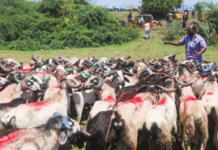Kolkata–A section of beekeepers, farmers and activists marched in protest here against GM Mustard being considered for commercial cultivation in India.
GM mustard, if it does not face any public resistance, could become India’s first GM food crop released for cultivation by regulator Genetic Engineering Appraisal Committee (GEAC).
However, in stiff opposition, a group of NGOs, activists and farmers united under the banner of GM Free West Bengal staged a “Sarson Satyagraha” with street plays and discussions, asserting that they reject genetically modified foods.
The protest was held in tandem to those organised pan-India on Sunday. Participants also signed a petition against the GM crop.
“Mustard oil is used for consumption and even for babies as oil massages. We have a right to assert that our food remains safe and GM Mustard is not,” activist Rubi Rakhshit of MG. Gramodyog Sewa Sansthan told IANS.
Displaying posters and banners on their person, members of the Breakthrough Science Society, advocated going the organic way and to avoid purchasing GM foods as well as the sale of such products.
Beekeepers from various Bengal districts claimed that the crop would be lethal to the bees which are essential for pollination for production of vegetables, spices, horticulture, apples, peaches, strawberries and the like.
“Due to genetic modifications, the crop contains three genes sourced from soil bacterium and one of the genes called the bar gene, has made the plant resistant to a herbicide (or weed killer) brand-named Basta. That means, the usage of the weedkiller will increase in mustard cultivation and it will increase farmers’ expenditure,” the agitators said.
Recently, the Genetic Engineering Appraisal Committee (GEAC) — the regulator under the Ministry of Environment that can clear the GM mustard for commercial use in India — had sought public comments on safety aspects on the DMH-11 mustard variety developed by the Delhi University’s Centre for Genetic Manipulation of Crop Plants.
The ministry has put the sub-committee’s 133-page “Assessment of Food and Environmental Safety of GE mustard” (AFES) online and invited public comments before the GEAC takes the final decision on GM mustard. Comments can be submitted till October 5.
Quoting studies and scientists, research organisations like South Asia Biotechnology Centre (SABC) and Association of Biotechnology Led Enterprises, Agriculture Focus Group (ABLE-AFG) said while the GM mustard “bolsters honey bee population”, the “myths” associated with GM crops are nothing but fear-mongering.
The transgenic crop, Dhara Mustard Hybrid-11 (DMH-11) has been developed by the Centre for Genetic Manipulation of Crop Plants (CGMCP) in the University of Delhi.
Currently, GM cotton is the only transgenic crop commercially available in fields. (IANS)






